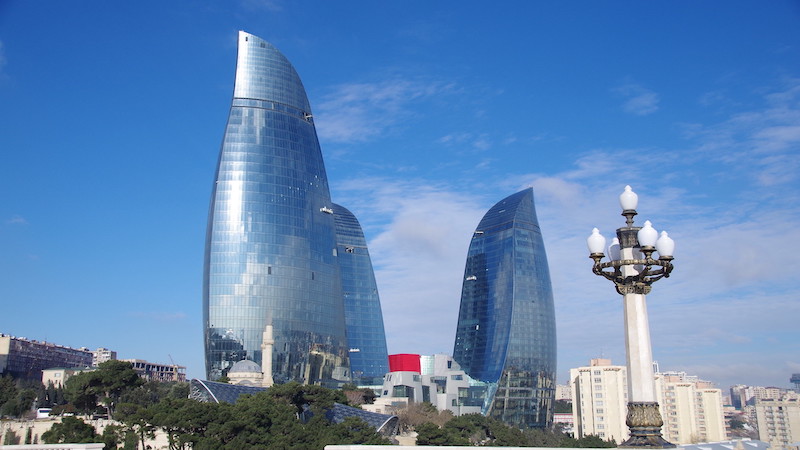Azerbaijan’s state oil and gas firm promises a green push but a lack of climate policies and plans to expand gas production are causing scepticism
Roaming around what is believed to be modern-day Baku over 700 years ago, the explorer Marco Polo gazed with wonder at “a spring from which gushes a stream of oil, in such abundance that a hundred ships may load there at once”.
The birthplace of crude refining, Azerbaijan has embedded fossil fuels in the fabric of its society for centuries. Oil, and more recently, gas have never stopped flowing from the vast reservoirs dotted around the Caspian basin.
Feeding energy-hungry consumers across Europe continues to bring immense wealth to the country and particularly its ruling elite. Fossil fuels make up over 90% of all exports and are by far the largest source of government revenue.
But as it gears up to host the Cop29 UN climate summit in November, Azerbaijan wants to show the world a different image. Burnishing its clean energy credentials through its state-owned oil and gas company, Socar, is part of the plan.
Amazon nations to tackle rainforest crime together in donor-funded new office
At a board meeting at the end of December, just a few weeks after the country was appointed as Cop host, Socar announced the creation of a green energy division called Socar Green. It is promising investments in solar and wind projects, green hydrogen production, and carbon capture and storage (CCS).
It was a largely unexpected move for a company planning to expand its gas output and recently criticised for lacking any energy transition strategy. The timing sparked suspicions among international observers: are they serious about it or is this just greenwashing?
“A green division is meaningless for the climate without an accompanying plan to phase out oil and gas”, Myriam Douo, a senior campaigner with Oil Change International, told Climate Home. “The reality is that to avoid catastrophic climate breakdown more than half of fossil fuels in existing fields must stay in the ground”.
Oil and gas keep flowing
Despite being heavily reliant on oil and gas, in global terms Azerbaijan is not a major producer. It pumps less than 1% of the world’s oil and gas output.
Its oil is expected to run out in about 25 years and production is already going down slightly as reserves are depleted. But it has enough gas for nearly 100 years and is exploiting more and more of it each year. Industry analysts Rystad expect its gas production to rise by a third in the next ten years.
“The country will not be producing oil and gas forever”, said Gulmira Rzayeva, an Azerbaijani senior research fellow at the Oxford Institute for Energy Studies. “But consumers in Europe, Turkey, Georgia need these hydrocarbons now and, if Azerbaijan alone stops extracting oil and gas, it will absolutely not change anything for the energy transition of the world. If there are such plans, they need to involve all producers”.
Harjeet Singh, a campaigner at the Fossil Fuel Non-Proliferation Treaty Initiative, agreed that to move away from fossil fuels all nations need to “act in concert, each according to their fair share and historical responsibility”. But he added that”every fossil fuel producer, including Azerbaijan, must have a clear transition plan to phase out fossil fuels”.
No transition plans
Government-controlled Socar is at the heart of Azerbaijan’s money-spinning machine. It extracts, transports and refines fossil fuels, usually in partnership with private European companies like BP and Total or other state-run firms like UAE-based Adnoc.
It is also one of the most worst oil and gas companies in the world in terms of its climate credentials, according to the Oil and Gas Benchmark. Out of 99 firms, its researchers ranked Socar 91st.
Amir Sokolowski is global director of climate at CDP, the non-profit behind the benchmark. He says that, at the time of their analysis late last year, “there were no transition plans to speak of and these take a very, very long time to develop”.
Governments fail to agree timeline for climate science reports in fraught IPCC talks
The firm has no emission reduction targets, no commitment to supporting human rights and no long-term transition plan although it does have a “low-carbon development strategy”.
Socar’s latest accounts dedicate pages and pages to oil and gas operations but only a very small paragraph to any form of green energy activities. Their use of wind and solar energy, the report indicated, was limited to powering measuring devices installed on oil and gas pipelines and to illuminating some office buildings.
“This would not seem to be a high priority on their agenda, but we can hope that with the spotlight of hosting Cop29 things may start to change”, Sokolowski added.
Renewables potential
Azerbaijan’s history with renewable energy is largely one of untapped potential and unmet expectations.
In 2020 Azerbaijan set a target of increasing the share of renewables in its electricity mix to 30% by 2030.
Since then, its barely changed, still standing at 6%, which is almost entirely hydropower rather than wind or solar.
The country has “abundant” wind and solar resources, according to a recent World Bank report, but while investment projects have been announced, “little progress” has been made on the grou
Read More

